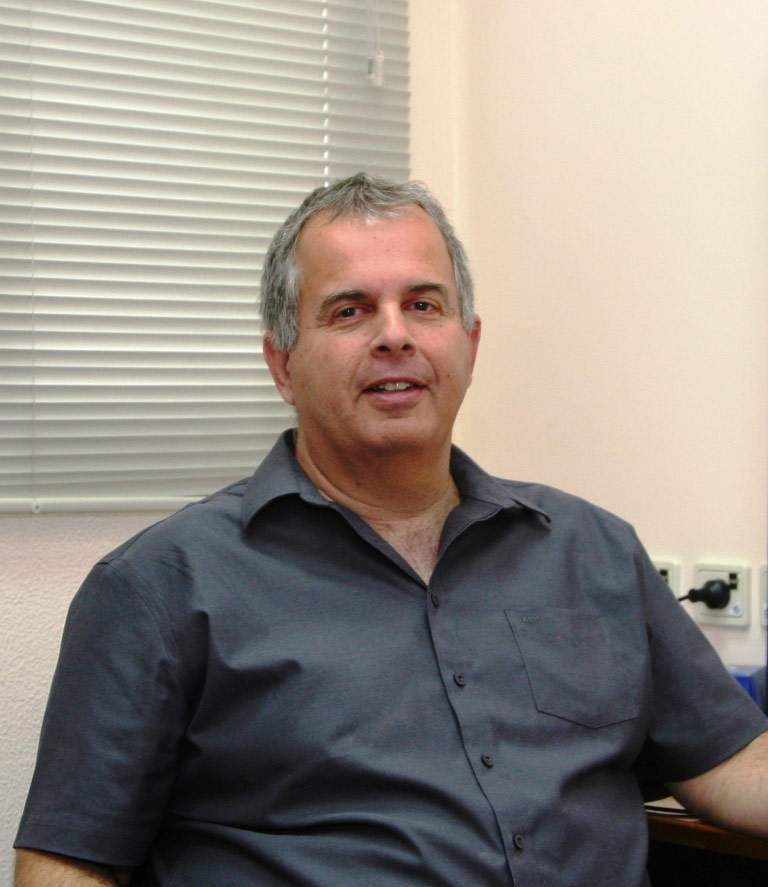“The time I spent at the Institute was the best period of my life,” says Dr. Danny Kandel, Senior Director of Advanced Development for KLA-Tencor, Israel. The Israeli branch of this international corporation, based in Silicon Valley, produces accurate metrology systems for quality control in the silicon chip industry. Around 500 engineers and professionals work for the company in Israel, in two different locations.
Kandel was born in Kiryat Ono, near Tel Aviv. His parents had declined to enroll him in the activities for science-oriented children at the Weizmann Institute but, he says, that changed when he got a bit older and more “in control of my own fate.” In high school, he took programming courses offered by Tel Aviv University. His army service, in a Nahal unit, included founding a new kibbutz in the Negev. Afterward, Kandel completed a B.Sc. in physics and mathematics at the Hebrew University of Jerusalem before coming to the Weizmann Institute.
His M.Sc. research, conducted in the group of
Prof. Michael Kirson of the Particle Physics Department (today the Particle Physics and Astrophysics Department), focused on theoretical nuclear physics. Kandel remembers that period as intense but rewarding: “We worked very hard; the courses were especially demanding. But after all the hard work, we felt that we had actually succeeded in understanding things. There is no greater pleasure than understanding something really new about the world. All the effort, the long nights, the stress – these all vanished when we were washed by the waves of satisfaction that come with new comprehension.”
His doctorate (in statistical physics) was completed under the guidance of
Prof. Eytan Domany of the Physics of Complex Systems Department. Kandel met and married Ditza Auerbach, then a doctoral student in the research group of
Prof. Itamar Procaccia at the Institute. The couple had three children together while Kandel completed postdoctoral research at the University of Maryland and Harvard University, and then returned to the Institute as a senior scientist in the Physics of Complex Systems Department.
But Kandel was lured by the possibility of conducting research with more practical, industry-oriented applications, and he joined the research and development team at KLA-Tencor’s facility in Migdal Ha’emek. “They tell us that the ongoing shrinkage of electronic components will slow down, or maybe even stop,” he says, “but in the meantime, the components being produced industrially get smaller and denser every year. That presents a serious challenge for quality controllers, who must currently achieve a level of precision down to less than a single nanometer.”
Despite his duties as director of Advanced Development for the company’s Israeli branch, Kandel still keeps up his ties with Institute scientists, as well as with his former fellow students. “My studies at the Institute were an enlightening experience for me and my friends,” he says. “We learned how to learn. How to conduct research. How to ask questions; how to try to answer them. If you can do this, the sky is the limit. If you can do it correctly, you can do anything, invent anything.”
Quality control for silicon chips is a complex challenge: Measurement systems based on optics are limited to the length of a wave of visible light, around 400 nanometers. This is a crude tool for today’s electronics – the thickness of a line on a modern silicon chip is around 20 nm. That is akin to an elephant trying to feel a single grain of sand under its foot. To get around this obstacle, the KLA-Tencor system makes direct and indirect use of a number of advanced optical and imaging techniques, including those based on light scattering from the object measured. The methods for processing these measurements to produce results were also developed by the company.

